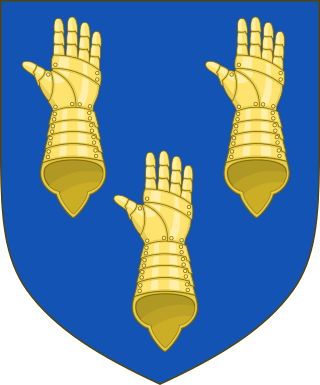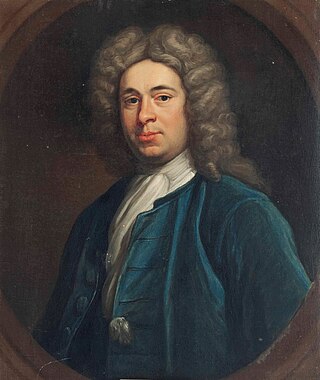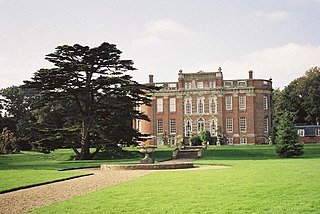Related Research Articles

Richard Edgcumbe, 1st Baron Edgcumbe, of Mount Edgcumbe in Cornwall, was an English Whig politician who sat in the English and British House of Commons from 1701 until 1742 when he was raised to the peerage as Baron Edgcumbe. He is memorialised by Edgecombe County, North Carolina.

Sir William Yonge, 4th Baronet, , of Escot House in the parish of Talaton in Devon, was an English politician who sat in the House of Commons for 39 years from 1715 to 1754.

Henry Vane, 1st Earl of Darlington, PC, known as Lord Barnard between 1753 and 1754, was a British politician who sat in the House of Commons from 1726 to 1753 when he succeeded to a peerage as Baron Barnard.
Peter Burrell, of Langley Park, Beckenham, Kent, and Mark Lane, Fenchurch St., London, was a British merchant and politician who sat in the House of Commons from 1722 to 1756.
William Richard Chetwynd, 3rd Viscount Chetwynd was a British politician who sat in the House of Commons from 1715 to 1770.

Sir William Courtenay, 2nd Baronet of Powderham Castle, Powderham, Devon, was an English landowner, a leading member of the Devonshire gentry and Tory politician who sat in the English House of Commons from 1701 to 1707 and in the British House of Commons almost continually from 1707 to 1735.

Henry Furnese, of Gunnersbury House, Middlesex, was a British merchant and politician who sat in the House of Commons between 1720 and 1756.

Sir John Evelyn, 2nd Baronet was a British courtier and Whig politician who sat in the House of Commons for 40 years from 1727 to 1767.

George Treby of Plympton House, Plympton St Maurice, Devon, was an English Whig politician who sat in the House of Commons for 34 years from 1708 to 1742. He was Secretary at War from 1718 to 1724, and Master of the Household from 1730 to 1741. He built Plympton House between 1715 and 1720, which his father began and left unfinished at his death in 1700.
Hon. Sir William Stanhope (1702–72), of Eythrope, Buckinghamshire, was an English landowner and opposition Whig politician, who sat in the House of Commons for 35 years between 1727 and 1768. Afflicted with deafness and ill-health, he travelled frequently and was often absent from Parliament.

Thomas Salusbury, of Shotwick Park, near Chester, born as Thomas Brereton, was a British Whig politician who sat in the House of Commons between 1724 and 1756. He was also Lord Mayor of Liverpool.
John Jeffreys of The Priory, Brecon, and Sheen, Surrey, was a Welsh politician who sat in the House of Commons from 1734 to 1766. He lost a fortune gambling but was awarded lucrative public positions under successive Administrations.

Membland is an historic estate in the parish of Newton and Noss, Devon, situated about 8 miles south-east of the centre of Plymouth. The estate was purchased in about 1877 by Edward Baring, 1st Baron Revelstoke (1828–1897), senior partner of Barings Bank, who rebuilt the mansion house known as Membland Hall. He suffered financial troubles and in 1899 the estate and Hall were sold to property developer John Headon Stanbury. A year later Membland was sold to ship builder William Cresswell Gray. The house became derelict after World War I and was demolished in 1927. Several of the estate's service buildings survive, including the Bull and Bear gatekeeper's lodge, stables, gasworks, forge and laundry. On the site of the house a smaller dwelling was built between 1966 and 1968.
William Rawlinson Earle, of Eastcourt House, Crudwell, near Malmesbury, Wiltshire, was a British politician who sat in the House of Commons for 40 years between 1727 and 1768.
Roger Tuckfield, of Raddon Court, Devon, was a British landowner and Whig politician who sat in the House of Commons for 27 years between 1708 and 1739.

Sir Humphrey Howorth (c.1684–1755), of Maesllwch Castle, Radnorshire, was a British landowner and Whig politician who sat in the House of Commons for 33 years from 1722 to 1755.

George Chafin or Chaffin, of Chettle House, Dorset, England, was a British landowner and Tory politician who sat in the House of Commons from 1713 to 1754.
John Burridge (c.1681–1753) of London and Lyme Regis, Dorset was a British merchant and Whig politician who sat in the House of Commons from 1710 to 1728.
Robert Vyner (1686–1777) of Swakeleys, Middlesex, and Gautby, Lincolnshire, was a British politician who sat in the House of Commons for 27 years between 1710 and 1761.
James Cocks, of Reigate, Surrey, was a British lawyer and Whig politician who sat in the House of Commons between 1707 and 1747.
References
- 1 2 3 "STERT, Arthur (d.1755), of Membland, nr. Modbury, Devon". History of Parliament Online. Retrieved 2 January 2019.
- ↑ Britton, John, The Beauties of England and Wales; or, Delineations Topographical, Historical and Descriptive of Each County, Vol 4, London,1803, p.136